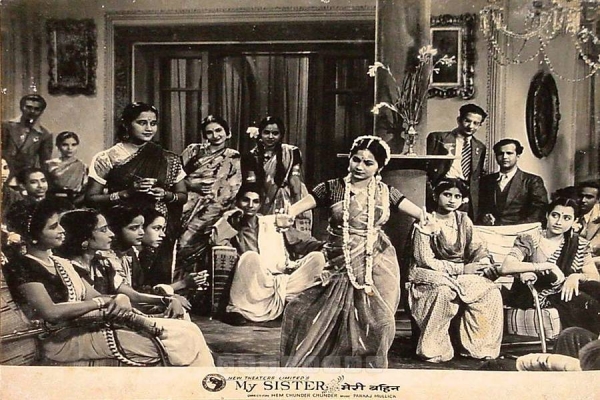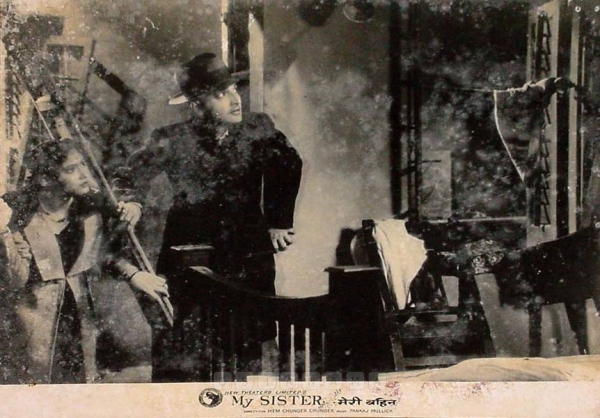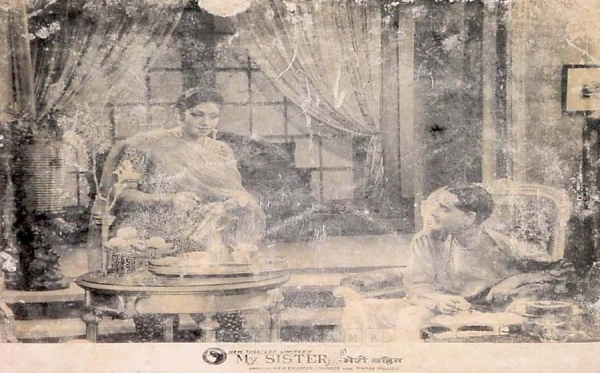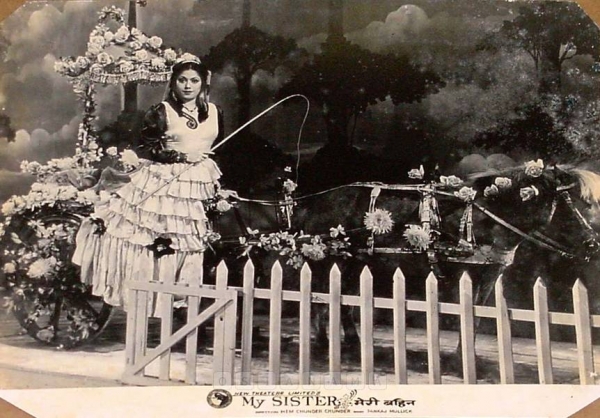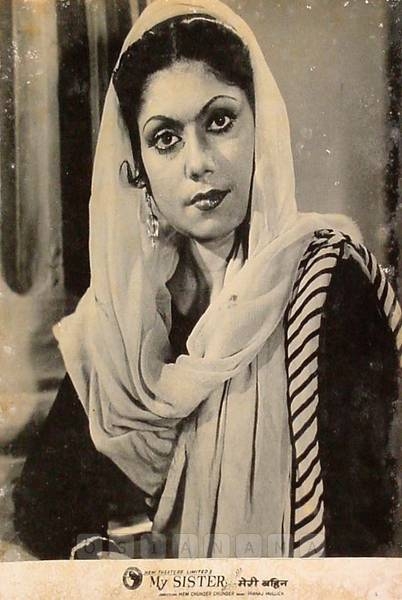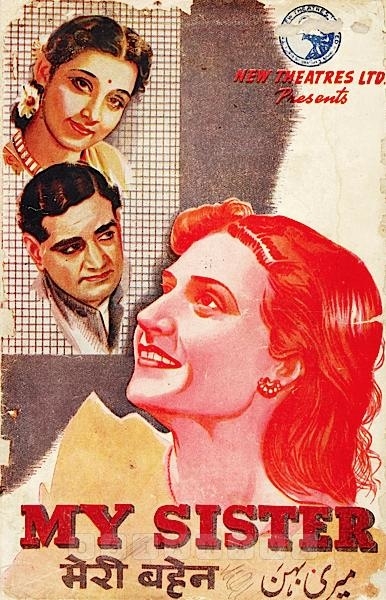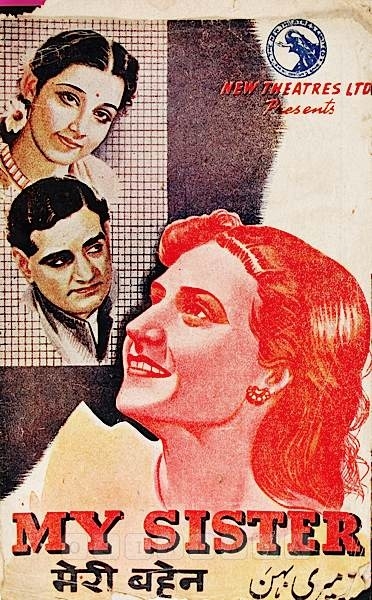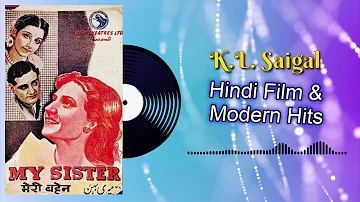Indian films and posters from 1930: film(Bahen)(1941)[with
----------------------------------------------------------------------------------------------------------------------------------------------------------------------------------------
Indian films and posters from 1930: film (Meri Bahen)(1962)
----------------------------------------------------------------------------------------------------------
| Meri Bahen a.k.a. My Sister | Hemchandra Chunder | K. L. Saigal, Tulsi Chakraborty, Chandrabati Devi, Sumitra Devi, Nawab, Akhtar Jehan, Hiralal, Tandon | Family Social | Music: Pankaj Mullick Lyrics: Pandit Bhushan |
Sumitra Devi (actress) - Wikipedia
Sumitra Devi (actress)
Sumitra Devi
| |
|---|---|
সুমিত্রা দেবী
| |
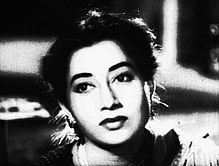
Sumitra Devi in 1956
| |
| Born |
Nilima Chattopadhyay[1]
22 July 1923[1][2] |
| Died | 28 August 1990 (aged 67) [1] |
| Nationality | Indian |
| Alma mater | Deshbandhu Girls' High School, Kolkata[1] |
| Occupation | Actress |
| Years active | 1944-1964 |
| Era | 1940s 1950s |
Notable work
| Sandhi Meri Bahen Pather Dabi Abhijog Devi Chowdhurani Swami Mamta Saheb Bibi Golam Jagte Raho Andhare Alo Joutuk Kinu Gowalar Gali |
| Spouse(s) | Debi Mukherjee[1] |
| Children | Bulbul[3] |
| Parent(s) |
|
| Awards | BFJA Awards[1] |
Sumitra Devi was born of a rich Brahmin family in 1923 at Shiuri, in Birbhum, West Bengal.[1] At her teenage, she was immensely influenced by the beauty and stature of the veteran actress Kanan Devi and aspired to be an actress.[8][10] In 1943 she was summoned for an interview and look test in the office of New Theatres and was finally cast opposite K. L. Saigal in Hemchander Chander’s Meri Bahen (1944).[11] During the making of this film she was offered to play the lead in Apurba Mitra’s Bengali film Sandhi (1944) which happened to be her debut film.[11] The film achieved enormous success and won her the BFJA Award for Best Actress in 1945.[1] In the late 1940s she established herself as a leading actress of Bollywood with roles in films such as Vasiyatnama (1945), Bhai Dooj (1947), Oonch Neech (1948) and Vijay Yatra (1948).[1] She was adulated for her role as a single mother in Gunjal's Mamta (1952).[12] Filmzack wrote, "She manipulated all her magnificent characteristics to vivify her role; her calmness, her softness, pain and pang and all were infused into one."[11] She was further acclaimed for her role in films such as Deewana (1952), Ghungroo (1952), Mayurpankh (1954), Chor Bazaar (1954) and Jagte Raho (1956).[1]
She sustained her career in Bengali cinema also with films such as Abhijog (1947), Pather Dabi (1947), Pratibad (1948), Joyjatra (1948), Swami (1949), Devi Chowdhurani (1949), Samar (1950), Dasyu Mohan (1955).[11] She has been idolized for her role as the beautiful alcoholic wife of a landlord in Kartik Chattopadhyay's cult classic Saheb Bibi Golam (1956) which is an adaptation of Bimal Mitra's classic novel of the same name.[10][13] Her portrayal of Bijali, a nautch girl with a bereaved heart in Haridas Bhattacharya’s National Award winning Bengali film Aandhare Alo (1957) acquired an overwhelmed critical response.[14][10] She also garnered acclamation for her roles in Bengali films such as Ekdin Ratre (1956), Nilachaley Mahaprabhu (1957), Joutuk (1958) and Kinu Gowalar Gali (1964).[10][7] In the late fifties, she was invited to the Asian Film Festival in China as a delegate from India.[10]
Early life
Career
During her teenage, she was immensely influenced by the beauty and stature of the veteran actresses like Chandrabati Devi and Kanan Devi and aspired to be an actress. She decided to send an application letter along with a photograph of her own to the office of New Theatres. As her father was conservative, she decided to do it secretly and to make her plan fruitful, she sought the help of her younger brother Ranajit, who agreed to cooperate with her.[15] Her letter was answered and she was summoned for an interview and look test. At the office of New Theatres, she was asked to read an article thoroughly and she mesmerized everyone present there with her beauty as well as her lucid, euphonic voice. She was chosen for the leading role opposite K. L. Saigal in New Theatres's Meri Bahen (1944).[16] Nilima adopted her screen name Sumitra Devi.[17][18] Though Meri Bahen was supposed to be the debut film of Sumitra Devi, she finally made her debut with Apurba Mitra's Bengali film Sandhi (1944), which became a huge hit at the box office.[19][20] There are different speculations regarding how she attained her role in Sandhi (1944). Anandalok wrote that she was stalled on her way to the shooting floor of Meri Bahen, by Apurba Mitra who offered her to act in his directorial venture.[21] Cineplot claimed that it was actually Sumitra Devi herself who proposed Debaki Bose to act in his film and it was Bose who finally cast her in his nephew Apurba Mitra's directorial venture. According to the source, Bose wanted to enquire whether she had her father's consent to step into filmdom. She confessed that she did not have and her father was too conservative to provide his consent to this. As Bose was keen to cast her, he requested B. N. Sircar to persuade her father, Murali Chattopadhyay to give his consent. As B. N. Sircar was the son of Sir M. N. Sirkar, an eminent advocate[22] and a close friend to Murali Chattopadhyay, he finally yielded to Sircar's imploration and reluctantly gave his consent.[4] After the film had been released, she was applauded for her unlaboured acting skill as well as credited as having an "outstanding luminous screen presence".[10] The film won her the Bengal Film Journalists' Association - Best Actress Award in 1945.[23] Meri Bahen (1944) achieved remarkable success upon release. It became the fourth highest-grossing film of the year.[24] She, then appeared in Soumyen Mukhopadhyay's Hindi film Vasiyatnama (1945) which was originally an adaptation of veteran Bengali author Bamkim Chandra Chattopadhyay's famous novel Krishnakanter Will.[25] In this film, she played the character of a beautiful widow who seduces the male protagonist, elopes with him and ultimately gets killed by him. She earned rave reviews for her enticing as well as doleful performance in the film.[10] Filmstaan wrote, "She had that melancholia which she manipulated together with her beauty to vitalize the character of Rohini."[25] Her next big turn was Satish Dasgupta and Digambar Chattopadhay's directorial venture Pather Dabi (1947) which was an adaptation of the renowned Bengali author Sarat Chandra Chattopadhyay's novel of the same name and also starred Debi Mukherjee in lead.[25] The film was a massive success at box office as its content dealt with the various aspects of contemporary Indian freedom movement.[25] She attained positive review from critics for her performance in the film.[26] She was again paired with Mukherjee in Sushil Majumdar's Abhijog (1947), which became another huge success at box office.[10] Her next turn was Hemchandra Chandra's bilingual venture Oonch Neech (1948) whose Bengali version was released under the title Pratibad. The film achieved an enormous commercial success on both the national and regional front.[25] She appeared in Niren Lahiri's bilingual film Vijay Yatra (1948) whose Bengali version was released under the title Joyjatra.[25] Her next big turn was Satish Dasgupta's Devi Chowdhurani (1949) which was an adaptation of the renowned Bengali author Bankim Chandra Chattopadhyay's classic novel of the same name.[11] She delineated the character of a Prafulla who is abandoned by her clink, gets kidnapped by some ruffians but manages to escape and hides herself in a lone forest where she meets a person who trains her as the leading figure of his gang of robbers. She earned mixed review for her performance in the film as several connoisseurs adjudged her too buxom to fit in the character and criticised her stating that she lacked the vim and vigour of Prafulla.[10] The film was a major success at box office."Initially I was getting befogged whether she would love the script or reject it. I kept narrating on and she was there with those inert eyes, patiently sitting on her couch and listening to me. Once in a while she was enquiring into something but that was all. Overall she became reticent. As I went on, I saw her altering her posture with her elbow supported on the armrest of her couch and I envisioned the scenario at once, the scenario of Bhootnath sitting before a prepossessing Pateshwari boozing over her elbow rested on her lavish cushion."The film was released on 9 March 1956 and turned out as a massive hit at the box office.[31] In 1957, she appeared in Kartik Chattopadhyay's another blockbuster Nilachaley Mahaprabhu. She was further adulated for her role as a nautch girl in Haridas Bhattacharya's National Award winning film Aandhare Alo (1957).
— Kartik Chattopadhyay during on an interview session with Ekaal[11]
Personal life
Sumitra Devi married actor Debi Mukherjee on 21 October 1946.[1] On 1 December 1947, she gave birth to her son Bulbul and on 11 December 1947, Mukherjee passed away.[25]Trivia
I think I would walk out of a lot of due compliments if I just use the term ‘beautiful’ to describe Sumitra Devi. She has the face that can arrest an unblinking gaze for long. She is marvellous. At the same time, I hold regards to the noble way she demonstrates herself. It is her etiquette and politeness that brightens up her beauty.Sumitra Devi was known for her exquisite beauty and subtle administration of seduction. It was said that she often cast her spell on the actors, directors, producers and journalists of her time.[26] Her Dasyu Mohan co-actor Pradeep Kumar, who described her as an "instance of the perfect harmonization of beauty and glory", used to come to the set of the film even when he had no schedule of shooting and spend his time sitting by and watching her raptly.[21] Uttam Kumar too, was spellbound before her on the set of Kartik Chattopadhyay's Saheb Bibi Golam.[26] Raj Kapoor said: "Sumitra Devi doesn't need any reference; she is beautiful than anything else." Shammi Kapoor said: "She has the face that can arrest an unblinking gaze for long."[11][32][33]
— Shammi Kapoor on Sumitra Devi[10]
Filmography
Hindi Films
| Year | Title | Director | Note | Ref. |
|---|---|---|---|---|
| 1944 | Meri Bahen | Hem Chunder | [16][34] | |
| 1945 | Vasiyatnama | Soumyen Mukherji | [35][36][37] | |
| 1947 | Bhai Dooj | Narottam Vyas | [38] | |
| 1948 | Oonch Neech | Hemchandra Chunder | [39] | |
| Vijay Yatra | Niren Lahiri | [40] | ||
| 1950 | Mashaal | Nitin Bose | [41][42] | |
| 1952 | Diwana | Abdur Rashid Kardar | [43][44] | |
| Mamta | Gunjal | [45][46] | ||
| Raja Harischandra | Raman B. Desai | [47][48] | ||
| Ghungroo | Hiren Bose | [49][50] | ||
| 1954 | Mayurpankh | Kishore Sahu | [51][52] | |
| Chor Bazaar | P. N. Arora | [53][54] | ||
| Raj Yogi Bharthari | Raman B. Desai | [55] | ||
| 1955 | Ganga Maiya | Chandrakant Gor | [56] | |
| Chirag-E-Chin | Chimanlal Trivedi | [57] | ||
| 1956 | Jagte Raho | Amit Maitra | [58] | |
| Sati Ansuya | Dhirubhai Desai | [59] | ||
| Delhi Darbar | Chandrakant Gor | [60] | ||
| 1958 | Hum Bhi Kuchh Kam Nahin | Raman B. Desai | ||
| 1962 | Kailashpati | Dhirubhai Desai | ||
| 1963 | Mere Arman Mere Sapne | Arabind Sen | ||
| Rustom-E-Baghdad | B J Patel | |||
| 1964 | Veer Bhimsen | Chandrakant Gor | ||
| 1974 | Har Har Mahadev | Chandrakant Gor | ||
| 1976 | Bajrangbali | Chandrakant Gor | ||
| 1977 | Bolo He Chakradhari | Cameo |
Bengali films
| Year | Title | Director | Note | Ref. |
|---|---|---|---|---|
| 1944 | Sandhi | Apurba Mitra | ||
| 1947 | Pather Dabi | Satish Dasgupta, Digambar Chattopadhyay |
[61] | |
| Abhijog | Sushil Majumdar | [62] | ||
| 1948 | Pratibad | Hemchandra Chandra | ||
| Joyjatra | Niren Lahiri | [63] | ||
| 1949 | Devi Chowdhurani | Satish Dasgupta | [64] | |
| Swami | Pashupati Chattopadhyay | [65] | ||
| 1950 | Samar | Nitin Bose | [66] | |
| 1951 | Niyoti | Naresh Mitra | ||
| 1955 | Dasyu Mohan | Ardhendu Mukhopadhyay | [67] | |
| 1956 | Asabarna | Pinaki Mukhopadhyay | [68] | |
| Saheb Bibi Golam | Kartik Chattopadhyay | [69] | ||
| Ekdin Ratre | Sambhu Mitra, Amit Maitra |
|||
| 1957 | Aandhare Alo | Haridas Bhattacharya | [70] | |
| Garer Math | Aaj Productions Unit | |||
| Khela Bhangar Khela | Ratan Chattopadhyay | [71] | ||
| Nilachaley Mahaprabhu | Kartik Chattopadhyay | [72] | ||
| 1958 | Joutuk | Jiban Gangopadhyay | [73] | |
| 1959 | Thakur Haridas | Gobinda Ray | ||
| 1964 | Kinu Gowalar Gali | O. C. Gangopadhyay | [74][75] |
...........................................................................
Cast


Tandon - IMDb
Tandon-MAST.cpe.0015900 -osianama.com
Crew
Writing
..................................................................................................
1:35:37
My Sister 1944 Hindi Movie
Watch Meri Bahen Movie Online,Meri Bahen Movie ... - Indiaflix Logo
....................................................................................................
Meri Bahen (1944) | Hindi Movie Review, Songs ... - MuVyz
| Browse Movie Titles (Alphabetically): 0-9 A B C D E F G H I J K L M N O P Q R S T U V W X Y Z | ||
| Yearwise: 2018 2017 2016 2015 2014 2013 2012 2011 2010s 2000s 1990s 1980s 1970s 1960s 1950s 1940s 1930s | ||
| Browse by Singer Name (Alphabetically): All A B C D E F G H I J K L M N O P Q R S T U V W X Y Z | ||
songs:-
ai qaatib-e-taqadir mujhe itanaa bataa de -2
kyo mujhase kafaa hai tu, kyaa maine kiyaa hai
auro ko khushi mujhako fakat dard-o-raj-o-gam
duniyaa ko hansi aur mujhe ronaa diyaa hai
kyaa maine kiyaa hai -2
kyo mujhase kafaa hai tu, kyaa maine kiyaa hai
hisse me sabake aa_i hai
hisse me sabake aa_i hai rangin bahaare
bad-faqtiyaan lekin mujhe shishe me utaare
pite hai
pite hai rog roz-o-shab muzzarrato ki may
mai hun ke sataa khun-e-jigar maine piyaa hai
kyaa maine piyaa hai
kyaa maine piyaa hai
thaa jinake dumak dam se ye aabaad aashiyaa
ho chahachahaati
ho chahachahaati bulabule jaane ga_i kahaan
juganu ki chamak hai na sitaaro ki roshani
is ghup adhere me hai meri jaan par bani
kyaa thi
kyaa thi
kyaa thi bataa ke jisaki sazaa tune mujhako di
kyaa thaa
kyaa thaa gunah ke jisakaa badalaa mujhase liyaa hai
kyaa maine kiyaa hai
kyaa maine kiyaa hai
kyo mujhase kafaa hai tu, kyaa maine kiyaa hai
do nainaa matavaare tihaare
ham par zulm kare ham par zulm kare
do nainaa matavaare tihaare
ham par zulm kare ham par zulm kare
naino me rahe to, sudh budh khoye
naino me rahe to, sudh budh khoye
chhipe to chhipe to chain hare
do nainaa
do nainaa matavaare tihaare
ham par zulm kare ham par zulm kare
tan tan ke chalae tir, nas nas me uthae pir
tan tan ke chalae tir, nas nas me uthae pir
madabhare rasile nithur bade
na dare na dhire dhare
do nainaa matavaare tihaare
ham par zulm kare ham par zulm kare
jab hoti ho
jab hoti ho tum us paar
man ki bina ki baj uthate hai jor jor se taar
man ki bina ki
man ki bina ki baj uthate hai jor jor se taar
paas ae to aise bhul gae
pal chhin me saba kuchh bhul gae
paas ae to aise bhul gae
pal chhin me saba kuchh bhul gae
khushiyo ke sote ubal pade, har ang to rag bhare
do nainaa matavaare tihaare
ham par zulm karem ham par zulm kare
jal jaane do is duniya ko
duniya ko
jab isme saccha pyaar nahi
yaha dil tode jaate hai
aur koi, aur koi
aur koi kisi ka yaar nahi
jal jaane do, jal jaane do
begaraj nahi
begaraj nahi koi nazaare
isme raza ki mastiyaan
dil le ne ko
dil le ne ko taiyaar hai sb
de ne ko koi taiyaar nahi
jal jaane do, jal jaane do
aanhko me kisi ki sharam nahi
sab hi to hai ? ke bande hai
aanhko me kisi ki sharam nahi
sab hi to hai ? ke bande hai
matlab ke, matlab ke
ye kisi ka kya gamkhaar nahi
ye kisi ka kya gamkhaar nahi
jal jaane do, jal jaane do
al jaane do is duniya ko
duniya ko
jab isme saccha pyaar nahi
yaha dil tode jaate hai
aur koi, aur koi
aur koi kisi ka yaar nahi
jal jaane do, jal jaane do
chhupo na chhupo na chhupo na
chhupo na chhupo na o pyaari sajaniyaa
humse chhupo na chhupo na
baanki rasili, baanki rasili
humaari sajaniyaa
humse chhupo na chhupo na
saajan se chhupo na o pyaari sajaniyaa
humse chhupo na chhupo na
milne ko aaye hai
milne ko aaye hai aakar milo
naino se naina milaakar milo
dekho bano na, na humko banaao
ruthi hui ho to
ruthi hui ho to ab maan jaao
bholi suratiyaa, bholi suratiyaa dikhaa do mohaniyaa
humse chhupo na chhupo na
saajan se chhupo na o pyaari sajaniyaa
humse chhupo na chhupo na
kaisa suhaana samay hai dilaara
bichhude hue, bichhude hue
do dilo ka sahaaraa
kaisa suhaana samay hai dilaara
bichhude hue do dilo ka sahara
aise me aao, aise me aao jaraa gungunaati
soi hui kismato ko jagaati
rum-jhum-jhum-jhum, rum-jhum-jhum-jhum
rum-jhum bajaati rupahali paijaniyaa
humse chhupo na chhupo na
saajan se chhupo na o pyaari sajaniyaa
mai in phulo sang dolu re dolu dolu dolu re
mai ku ku bolu re ku ku bolu re
mai koyal ki tarah bolu re bolu bolu bolu re
mai nachu or gau mai nachu or gau
rang raliya manau manau
thumak thumak kar chalu shan se ras barsau ri
thumak thumak kar chalu shan se ras barsau ri
har din ko ro lu re har din ko ro lu re
mai in phulo sang dolu re dolu dolu dolu re
kabhi phulo ke sang bulbul ki mai shadi roz rachati
kabhi phulo ke sang bulbul ki mai shadi roz rachati
kabhi sabnam ki mastani aankho ke moti more lutate
sabnam ki mastani aankho ke moti more lutate
amrit sa gholu ge amrit sa gholu ge
mai ku ku bolu re ku ku bolu re
mai koyal ki tarah bolu re bolu bolu bolu re
haay kis boot ki mohabbat me dard tha aur sune
haay kis boot ki mohabbat me dard tha aur sune
jingadi kab khatam hui jine se fiza aur kahe
hamne paya to paya hai ye wafao ka sila
hamne paya to paya hai ye wafao ka sila
muft badnam huye bebas mulakat halat me
isliye daulate dil uspe luta di hamne
isliye daulate dil uspe luta di hamne
aap hi apno se kyu mayaj-e-gunjaar haye re
ghut ke mar jaye yehi dil me hai hasrat baki
ghut ke mar jaye yehi dil me hai hasrat baki
mudato gujari hai be-yaar madadgar halat me
mudato gujari hai be-yaar madadgar halat me
haay kis baat ne kiye hai darshan is halat me
piya milan ko jana ha piya milan ko jana
jag ki raah man ki mauj dono ko nibhana
piya milan ko jana ha piya milan ko jana
kante bikhara ke chalu pani dhalaka ke chalu
kante bikhara ke chalu pani dhalaka ke chalu
sukh ke liye sekh rakhu, sukh ke liye sekh rakhu
pahale dukh uthana piya milan ko jana
payal ko bandh ke, payal ko bandh ke
uthi chubh naan ke, payal ko badh ke
dhire dhire dabe dabe pavo ko badhana
piya milan ko jana
bujhe deeye andheri raat, aankho par dono hath
bujhe deeye andheri raat, aankho par dono hath
kaise kare kathin bat, kaise kare kathin bat
chal ke aazamana piya milan ko jana
ha piya milan ko jana jana
piya milan ko jana jana
piya milan ko jana ha piya milan ko jana
jag ki raah man ki mauj dono ko nibhana
piya milan ko jana ha piya milan ko jana
kante bikhara ke chalu pani dhalaka ke chalu
kante bikhara ke chalu pani dhalaka ke chalu
sukh ke liye sekh rakhu, sukh ke liye sekh rakhu
pahale dukh uthana piya milan ko jana
payal ko bandh ke, payal ko bandh ke
uthi chubh naan ke, payal ko badh ke
dhire dhire dabe dabe pavo ko badhana
piya milan ko jana
bujhe deeye andheri raat, aankho par dono hath
bujhe deeye andheri raat, aankho par dono hath
kaise kare kathin bat, kaise kare kathin bat
chal ke aazamana piya milan ko jana
ha piya milan ko jana jana
piya milan ko jana jana
piya milan ko jana ha piya milan ko jana
piya milan ko jana ha piya milan ko jana
jag ki raah man ki mauj dono ko nibhana
piya milan ko jana ha piya milan ko jana
kante bikhara ke chalu pani dhalaka ke chalu
kante bikhara ke chalu pani dhalaka ke chalu
sukh ke liye sekh rakhu, sukh ke liye sekh rakhu
pahale dukh uthana piya milan ko jana
payal ko bandh ke, payal ko bandh ke
uthi chubh naan ke, payal ko badh ke
dhire dhire dabe dabe pavo ko badhana
piya milan ko jana
bujhe deeye andheri raat, aankho par dono hath
bujhe deeye andheri raat, aankho par dono hath
kaise kare kathin bat, kaise kare kathin bat
chal ke aazamana piya milan ko jana
ha piya milan ko jana jana
piya milan ko jana jana
piya milan ko jana ha piya milan ko jana
 | Suno Ek Hare Ped Ki Daali Par |
Rekha Malik | Pankaj Mullick | |
| Meri Bahen (1944) | Pandit Bhushan |
[New post] Piya Milan Ko Jaana
| Apr 16, 2023, 9:24 PM (4 days ago) |   | ||
| ||||
The star cast of the film ‘My Sister’ is listed as KL Saigal, Sumitra Devi, Nawab, Akhtar Jahan, Chandrawati, Heera Lal, Tulsi Chakravarty, Tandon, AH Shor, and Rajlaxmi. This film has 7 songs listed. The film and its songs are available.
Before closing, I must acknowledge the source of this information. This song has been pointed out to me by Shri Anoop ji Gadodia of Kolkata. I first met Anoop ji at a seminar related to film music, in Bombay. This was before the Corona lockdowns had disrupted life. Anoop ji is a film buff. From a very young age, he has had an ear for music. He listens to meaningful music of all eras, but his area of interest is the initial years of Hindi cinema. His depth of knowledge about Hindi cinema, its music, the artists and the performers is breathtaking. He remains away from limelight, almost a reclusive lifestyle. He was in Delhi last month, to present a webinar on the initial years of Hindi film music. This song came up in our discussions, and he then pointed out this obscure reuse.
Let’s view and listen to this surprising female version of the iconic song.
Song - Piya Milan Ko Jaana (My Sister) (1944) Singer - Unidentified Female Voice, Lyrics - Unattributed, MD - Pankaj Mullick
Lyrics
piyaa milan ko jaanaa. . .
piyaa milan ko jaanaa
kaante bikhraa ke chaloon
paani dhalkaa ke chaloon
kaante bikhraa ke chaloon
paani dhalkaa ke chaloon
sukh ke liye seekh rakhoon
sukh ke liye seekh rakhoon
pehle dukh uthaanaa..aa..aa
piyaa milan ko jaanaa
piyaa milan ko jaanaa
पिया मिलन को जाना॰ ॰ ॰
पिया मिलन को जाना
कांटे बिखरा के चलूँ
पानी ढलका के चलूँ
कांटे बिखरा के चलूँ
पानी ढलका के चलूँ
सुख के लिए सीख रखूँ
सुख के लिए सीख रखूँ
पहले दुख उठाना॰॰आ॰॰आ
पिया मिलन को जाना
पिया मिलन को जाना
.......................................................................................................................

